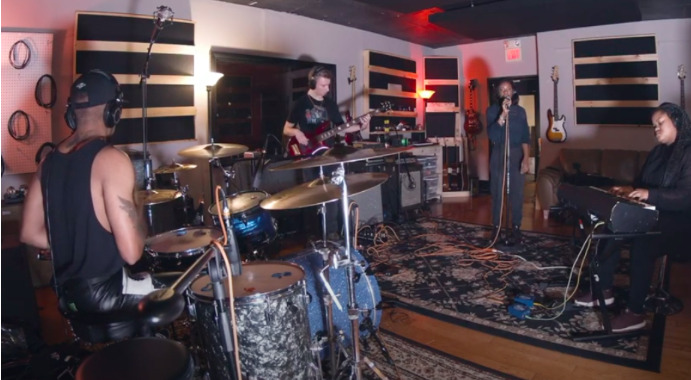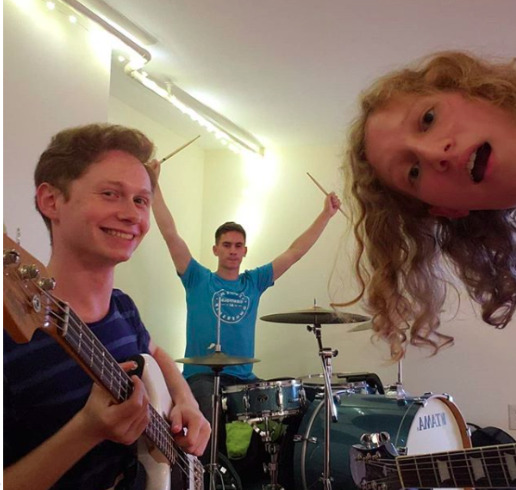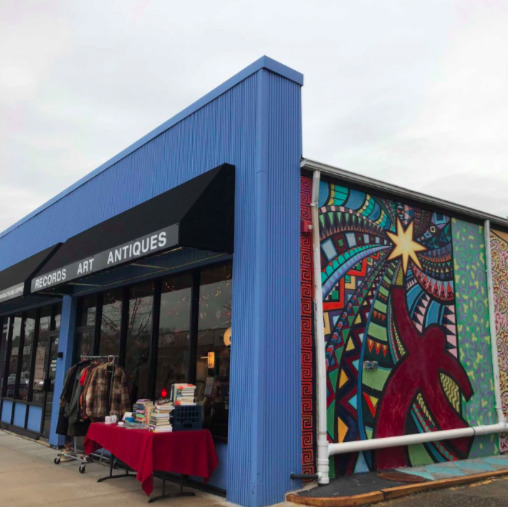Concerts were canceled, businesses closed and Rutgers students sent home because of the COVID-19 pandemic — but that hasn’t stopped New Brunswick musicians from playing their songs.

The only Rutgers student musicians left in town are those stuck with off-campus housing leases. Their basements were once concert venues, with floral carpets representing the stage, tapestries covering the windows and old amps and soundboards delivering low-fi music to packed audiences. All of the equipment is still in those basements, even though the audiences have decamped.
Many bands have begun using Instagram Live, YouTube, Facebook, Zoom and game platforms such as Animal Crossings and Club Penguin to perform from their homes. These platforms are great for exposure, though don’t address the loss of money from sales of tickets and merchandise.
The concert industry could lose up to $9 billion, if coronavirus restrictions aren’t lifted by the end of 2020, according to projections by the concert industry trade publication Pollstar. While canceled concerts are a hit to musicians’ incomes, many of New Brunswick’s local musicians were never relying on this money to pay their bills. Between the basement shows and bars, bands might be paid from $15 to $300 a night.
“We’ll play at the park, on the sidewalk, in the parking lot, at a five-year-old’s birthday party. We just want to play.” — Other Side of the Game singer Diya Drake
But now those musicians are finding other ways to connect with their audiences.
“We’re definitely missing out on the feeling and experience of playing a show, more than the money,” said Naomi Jay, keyboardist with the band OSG (Other Side of the Game). OSG is now giving its concerts over YouTube.
“The energy of playing in front of people who are listening in the moment is better,” Jay said. “It is chill when you play and focus on what you’re doing, but it’s not the same as when you’re sharing the experience with a group of people. You could talk to people after and exchange info, that’s not happening in our YouTube comments. It’s just my mom and dad.”
OSG’s music is a mixture of jazz, R&B, neo-soul, and hip hop . The band is fronted by Rutgers students Diya Drake on vocals, and Jay. Before the COVID-19 outbreak, the group performed at Rutgers events and bars every weekend. Now members are using this time at home to practice and upload a concert to YouTube every Thursday. They are also uploading a cover series, where they take suggestions from their fans.
Kova Tova is an indie rock band that incorporates alt rock, jazz and folk. Living together in a New Brunswick apartment, Rutgers students Amanda Leifer (vocals/guitar), Megad Eisenberg (bass/guitar) and Yoni Friedman (drums) are disappointed about the band’s final months. Pre-pandemic, they’d played basement shows and bars every two weeks, and had been planning an end-of-school-year backyard concert. Now they’ll be performing virtually for the radio station WRSU. Each had post-spring 2020 plans — to enroll in grad school, to study abroad or to move to California.
Fortunately, none of OSG’s or Kova Tova’s members have tested positive for COVID-19 — but many people close to them have, from parents to uncles and cousins. Looking at the infection numbers, it isn’t surprising that virtually everyone knows someone in their life who has caught the virus.
As of July 22, New Jersey had counted more than 179,000 COVID-19 cases, and 15,737 deaths – with more than 17,000 of those cases, and 1,400 deaths, in New Brunswick’s Middlesex County.
Musicians under psychological pressure
The outbreak and subsequent quarantine have not only affected people’s physical health and finances, but have exerted psychological pressure.
“I’ve been under the weather in mental ways,” explained Kova Tova frontwoman Leifer. “It’s cool to have the extra time, but it comes with having a lot of added stresses, anxiety, depression, and blah.”
“Blah is the exact word to describe this type of depression,” agreed Kova Tova bassist Eisenberg. “We’re trying to stay musically active, but the inspiration just doesn’t come when you’re in the house all day.”
“This is the end of Kova Tova, sadly. We had a good run and went out with a sad, sad whimper,” Leifer said.

Record shops take a hit
New Brunswick’s bands are not the only part of the music scene affected by the quarantine. The record store Chamber 43, in nearby Highland Park, has begun selling its records through Discogs, and all other items via Instagram and Facebook. The shop takes an active part in New Brunswick’s music scene, by hosting many musical events — including OSG’s EP release in August 2019. Chamber 43 is more than a record store: it’s also a social and event space, and sells vintage items and antiques. And there have been plans to open a coffee shop.
“We haven’t been able to make any sort of income, because people are trying to buy essentials right now,” said Chamber 43 owner David Martins. “We’ve sold some things online, but [COVID-19] is affecting us negatively. I’m still waiting to hear back from the government about loans and payroll assistance, so I can get my workers back in action.”
Martins plans to take advantage of Chamber 43’s downtime to incorporate a coffee shop in the space, a plan he’s had since 2017. He’s begun renovating: is putting up new shelves, and is working with Stumptown Coffee Roasters to supply the coffee beans. But of course, money is tight now, so Martins is relying on receiving loans to continue working.
Before the quarantine, Chamber 43 hosted a variety of events. Every month was filled with concerts, open mic nights, comedy shows, poetry readings and meetings of In Rotation, a book club for records. Chamber 43 has begun using Zoom for open mic nights and In Rotation meetings, and Martins is curating live Instagram shows.

“It’s not the same, obviously, because for our shows before we would sell tickets and merch, during and after the show,” Martins said. “The best thing we could do now is get donations, if people are generous enough to do that.”
New Brunswick’s musicians are refusing to let COVID-19 stop the music. They continue to practice, in preparation for when their shows can resume.
Said OSG’s Drake: “We’ll play at the park, on the sidewalk, in the parking lot, at a five-year-old’s birthday party. We just want to play.”

